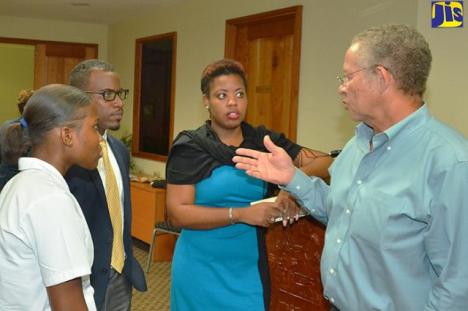 Chairman of Jamaica’s Caribbean Community (CARICOM) Review Commission and former prime minister, Bruce Golding (right), makes a point to participants at a youth forum hosted by the Commission at the University of the West Indies Regional Headquarters on Thursday, September 22. Listening from left are fellow participants Shantae Shand, Franz George and Kiddist McCoy. Photo: Rudranath Fraser
Chairman of Jamaica’s Caribbean Community (CARICOM) Review Commission and former prime minister, Bruce Golding (right), makes a point to participants at a youth forum hosted by the Commission at the University of the West Indies Regional Headquarters on Thursday, September 22. Listening from left are fellow participants Shantae Shand, Franz George and Kiddist McCoy. Photo: Rudranath Fraser
By Latonya Linton/ KINGSTON, Jamaica (JIS).- Chairman of Jamaica’s Caribbean Community (CARICOM) Review Commission and former prime minister, Bruce Golding, says CARICOM is not a failure, having achieved successes in several areas.
“I think we have done very well in terms of functional cooperation. If every country in CARICOM had to set up their own examination system, instead of having the Caribbean Examinations Council, it would be difficult for much of the smaller islands that have fewer resources than we do,” Golding said.
He was speaking at a youth forum hosted by the CARICOM Review Commission at the University of the West Indies Regional Headquarters, on Thursday, September 22.
The CARICOM Review Commission is the brainchild of Prime Minister Andrew Holness. It has been tasked to examine Jamaica’s role in the regional bloc and how it has impacted the country’s development.
Golding also cited institutions such as the Caribbean Agricultural Research and Development Institute (CARDI) and the Caribbean Disaster Emergency Management Agency (CDEMA) as successful areas of cooperation.
“We are all subject to natural disasters, and the response to natural disasters when they occur requires institutional building, capabilities, and it requires management. If every country had to set up (one) for itself, then you see the difficulties that many countries would have,” Golding said.
The former prime minister also argued that CARICOM is important for foreign policy coordination.
“There is strength in numbers. We have, in fact, been able to exert a significant amount of influence in some of the major councils of the world, simply because when we go there we have 14 votes,” the chairman said.
“I know of some occasions where there are some contentious issues in the Organization of American States and the United Nations, where balance is so close that 14 votes can make a difference, and that’s when the biggest of the big come knocking on our doors,” Golding added.
For his part, minister of state in the ministry of education, youth and information, Floyd Green, encouraged the youth to submit suggestions to the CARICOM Review Commission.
On the issue of integration, Green said this is being undermined “by the fact that it is so expensive for us to travel among our CARICOM states”.
He also mentioned that the University of the West Indies is becoming less integrated based on the make-up of the population on the campuses.
At the forum, the youth shared on issues such as regional integration and immigration.
CARICOM is a grouping of 20 countries: 15 member states and five associate members. It is home to approximately 16 million citizens, 60 percent of whom are under the age of 30, and from the main ethnic groups of indigenous peoples, Africans, Indians, Europeans, Chinese and Portuguese.
Topical issues such as trade practices, the treatment of Jamaicans travelling to other CARICOM countries, contrasts emerging between CARICOM’s strategies and goals and those of individual countries and how these can be reconciled are also to be explored by the Commission.
